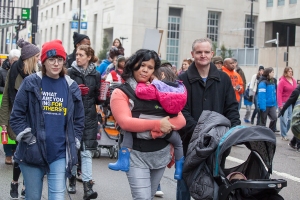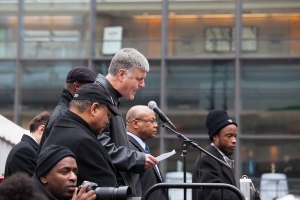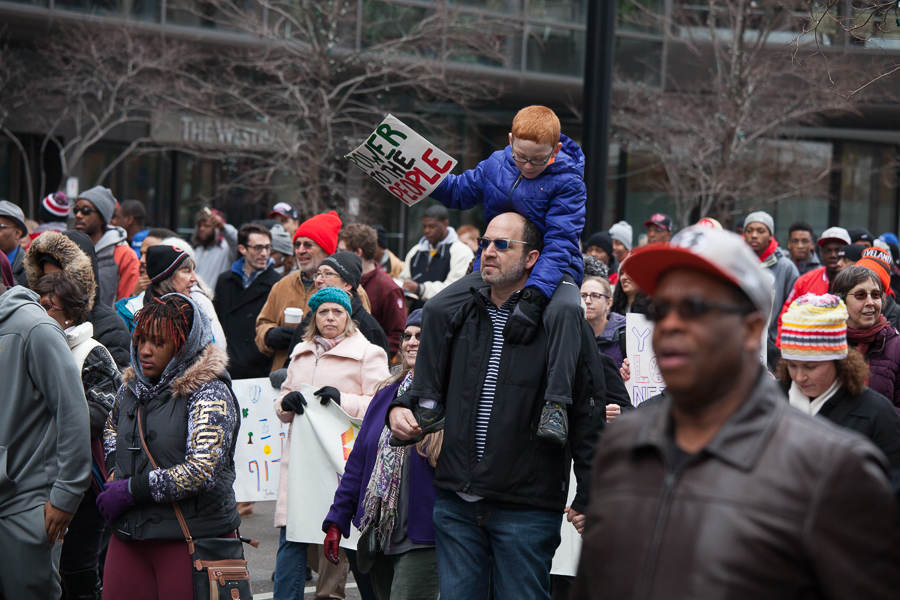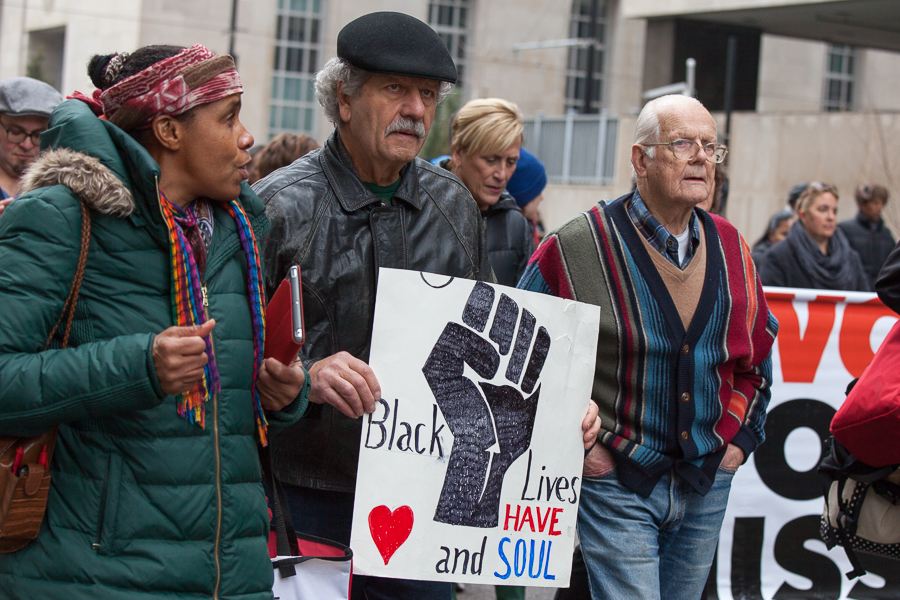Marchers–perhaps 2,000–gathered on Jan. 16 at the Freedom Center, then marched up Vine Street to Fountain Square to honor Dr. Martin Luther King, Jr. and to renew themselves to the King dream and the unfinished business of the nation’s creed that all are created equal.

It was a “salt and pepper” crowd, a mix of white and black marchers, including young families with their children.
“It’s beautiful that it’s so cultural, not just blacks here,” said Tonnia Robinson, 42, of Cincinnati. “That’s really touching.”
At Fountain Square, Courtis Fuller, news anchor and reporter with WLWT TV who served as master of ceremonies, made brief remarks. Before moving on to the events at the Taft Theater, Troy Jackson, director of the Amos Project, offered a quotation from King’s 1956 sermon at a Louisville church as a prayer for the crowd.
“Yes, it is true that if the Negro accepts his place, accepts exploitation and injustice, there will be peace. But it would be a peace boiled down to stagnant complacency, deadening passivity, and if peace means this, I don’t want peace.”

Jackson closed by asking that real peace hold sway in Cincinnati, the nation, and the world.
King may be best remembered for his “I Have a Dream” speech, which he delivered to more than 200,000 people gathered for the 1963 March on Washington.
The speech unnerved the powers that be and prompted the FBI to investigate King for alleged communist sympathies. When links to communism could not be found, the investigation morphed into a kompromat-style campaign to discredit King.
The head of the FBI’s domestic intelligence division at the time labeled King as “the most dangerous Negro” in the country. “Of course, King wasn’t dangerous to the country but to the status quo,” wrote Charles Blow, an op-ed columnist for The New York Times.
King was assassinated in April 1968 at the Lorraine Motel in Memphis. He was 39.

King was a radical Christian, a product of the Black prophetic tradition, and a courageous patriot, who dared to speak the truth about the corrosive effects of racism, poverty, militarism, and materialism, writes Cornel West, Professor of Philosophy and Christian Practice at Union Theological Seminary, in his book, The Radical King.
West writes that for King, “the fulfillment of his dream was for all poor and working people to live lives of decency and dignity.”

To recognize the birth of King, the third Monday in January was designated as a state holiday in Ohio in 1975 and a federal holiday in 1983.
MLK day was not officially observed in all 50 states until 2000. In some states, however, the observance of MLK day is shared with other historical figures. In Alabama, Arkansas, and Mississippi, for example, the day recognizes the birthdays of Martin Luther King and the Confederate Civil War general, Robert E. Lee.
The 2017 march in Cincinnati, organized by the MLK Coalition, Inc., was the city’s 42d annual celebration of King’s birth “dedicated to keeping Dr. King’s legacy vibrant in our community.” This year, MLK day precedes inauguration day, Jan. 20, when president-elect Donald Trump will be sworn into office.
In the view of Marcus Taylor, 40, of West Chester and an Alpha Phi Alpha alumnus, Trump has changed the political climate in ways that underscore King’s timeless call for action. “Trump and the sentiment that this election has drawn out in some of his supporters make it even more necessary for everyone to be more active in terms of commitment to social justice,” Taylor said.
Robinson agrees. “It is important that we stand together in the face of Trump,” she said. “People have to join in to make it happen instead of sitting back.”
“The history that is now is in our hands,” said Brian Taylor, a Black Lives Matter Cincinnati leadership team member, during a post-march event in the main library.
“We do not need to wait for the next King. We need to step into the moment and say ‘yes,’” said Taylor, for whom a liberation movement for oppressed people of all colors is more important than anti-Trump efforts.

For Rina Jibeau of Covington, King offered a universal message about human rights. “You can’t talk about brotherhood and exclude certain people.”
The marchers interviewed by C4AD all had hope for the future. They believe the dream might be deferred but it would not be denied. The national creed would be fulfilled.
“We are not a post-racial society, but if we take time to understand one another, we can get there,” Walker said. “Our children are the ones who will lead us to that place where we need to be.”
by Mike Brown, mbrown.c4ad@gmail.com
